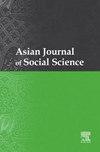Entrepreneurial urbanization and masculine identities: an exploratory study of Khon Kaen, Thailand
IF 1.2
4区 社会学
Q2 AREA STUDIES
引用次数: 0
Abstract
Our study identifies the relationships between entrepreneurial urbanization and masculine identities through the case study of smart city development in Khon Kaen, a secondary city in Thailand. We studied the planning and governance structure of the smart city plan, vis-à-vis the motivations, experiences, and responses to urban development in poor communities. We interviewed men and women from different livelihood, age, and class groups to answer the following questions: (a) How do masculine identities and roles shape entrepreneurial modes and processes of urbanization? Specifically, how is urban governance gendered? (b) How does urban development reinforce, reconfigure, or alienate masculine identities? We argue that while technocratic business masculinities are reinforced in an age of neoliberal urbanization, the spurring of privatized smart enclaves and knowledge economies threaten the identities of working-class men and their gendered experience of belonging in the city. The masculinization of urban elite networks accompanied by the feminization of the civil society further enables exclusionary modes of city governance to operate. This is brought about through the tokenizing of poor communities’ participation in planning processes and a manufacturing of cohesion through the appropriation of technocratic and evidence-based approaches by elite networks that typify technocratic masculine ideals, as opposed to the ‘feminine’ affective and consultative strategies employed by civil society groups.
创业型城市化与男性认同:泰国孔敬市的探索性研究
本研究通过对泰国二级城市孔庆市智慧城市发展的案例研究,确定了创业型城市化与男性身份之间的关系。我们研究了智慧城市规划的规划和治理结构,查看-à-vis贫困社区城市发展的动机、经验和响应。我们采访了来自不同生计、年龄和阶级群体的男性和女性,以回答以下问题:(a)男性身份和角色如何塑造创业模式和城市化进程?具体来说,城市治理是如何性别化的?(b)城市发展如何加强、重新配置或疏远男性特征?我们认为,在新自由主义城市化时代,技术官僚的商业男性气质得到了加强,但私有化的智能飞地和知识经济的刺激,威胁到了工人阶级男性的身份认同和他们在城市中的性别归属感。城市精英网络的男性化伴随着公民社会的女性化,进一步使排他性的城市治理模式得以运作。这是通过将贫困社区参与规划过程的标记化,以及通过精英网络采用技术官僚和基于证据的方法来制造凝聚力来实现的,这些方法代表了技术官僚的男性化理想,而不是“女性化”的情感和咨询策略由民间社会团体采用。
本文章由计算机程序翻译,如有差异,请以英文原文为准。
求助全文
约1分钟内获得全文
求助全文
来源期刊

Asian Journal of Social Science
Multiple-
CiteScore
1.20
自引率
0.00%
发文量
53
期刊介绍:
The Asian Journal of Social Science is a principal outlet for scholarly articles on Asian societies published by the Department of Sociology, National University of Singapore. AJSS provides a unique forum for theoretical debates and empirical analyses that move away from narrow disciplinary focus. It is committed to comparative research and articles that speak to cases beyond the traditional concerns of area and single-country studies. AJSS strongly encourages transdisciplinary analysis of contemporary and historical social change in Asia by offering a meeting space for international scholars across the social sciences, including anthropology, cultural studies, economics, geography, history, political science, psychology, and sociology. AJSS also welcomes humanities-oriented articles that speak to pertinent social issues. AJSS publishes internationally peer-reviewed research articles, special thematic issues and shorter symposiums. AJSS also publishes book reviews and review essays, research notes on Asian societies, and short essays of special interest to students of the region.
 求助内容:
求助内容: 应助结果提醒方式:
应助结果提醒方式:


